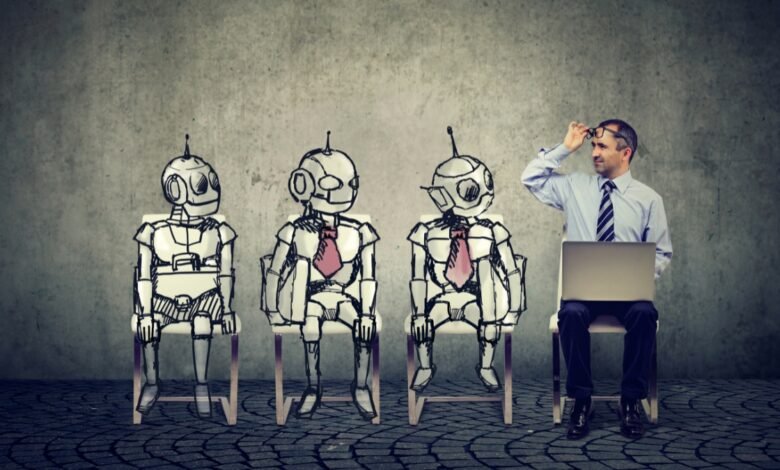AI vs. Humans: How big corporates are creating solutions to problems that do not exist!
As humanity stands on a precarious juncture, the 'mind versus machine' debate can no longer be one-sided.

Hi! This ‘biased’ article is brought to you by a living and breathing human being who is too afraid to lose his job. What causes this apprehension, you ask? I am cynical regarding the prospect that a machine might use my work (and the work of several others like me) using ‘high-tech plagiarism’ and get the better of me in content writing using the charade of a hot piece of technology called the ‘Artificial Intelligence’ (AI).
I would have penned this article sooner or later, but the news of PayTM (an Indian fintech giant) laying off 1000 employees without any scruples under the excuse of ‘automation’ and ‘cost-cutting’ has agitated me to a great extent.
Spoiler alert — the content written here will not be an extension of the baseless ‘all-goody tech euphoria’ getting propagated throughout the internet. It is so because I am not selling a course on ‘Mastering the AI,’ neither is this article sponsored by an ‘AI promoting start-up.’ I will present data to back my fear and emphasise a less-discussed aspect of the AI revolution. My fear will be the only ‘bias’ that will keep you entertained throughout this article and prove that this is not “bot-generated content!”
AI (Artificial Intelligence) is already making us ‘redundant’ rather than ‘evolved.’
PayTM, while laying off a thousand employees, issued a statement that read, “AI has delivered more than we expected it to.” The employees who lost their jobs here predominantly worked in sales, operation, and engineering. It is just an extension of the narrative claiming that ‘AI-propelled automation’ has been helping companies carry out ‘repetitive tasks’ efficiently and helping them further by cost-cutting (typically 10 to 15%) to maintain their profit margins during the ongoing global economic doldrums.
Even Google has hinted at the prospect of an ‘internal restructuring’ for which the livelihoods of nearly thirty thousand employees stay jeopardised. Google aims to do away with a significant portion of its workforce and use AI-based tools to automatically analyse, suggest, and create personalised advertisements to generate revenue. Hence, another mass layoff from Google is around the corner.
Research conducted by Resume Builders has exhumed a frightening trend after contacting nearly 750 global employers. Their study reveals that 37% of these companies replaced their workers with AI in 2023. In 2024, almost 44% of these companies plan to forego their ‘expendable’ human workforce and embrace AI as their substitute.
More than four lakh employees got laid off in the tech sector alone, and more than sixty thousand jobs in the global banking sectors featuring the names of giants like Citigroup, Credit Suisse, and Bank of America. Even the Big Four accounting firms (Deloitte, Ernst & Young (EY), KPMG, and PwC) laid off more than 3 lakh accountants in 2023, citing slow economic growth and an increasing dependence on AI.
Another report by the World Economic Forum (based on their conversation with 800 companies across the globe) revealed how the jobs of 11 million (1.1 crore) people stand jeopardised in the wake of the AI Revolution across 27 industries in 45 economies. Even Goldman Sachs has predicted that more than 30 crore jobs will get hurt worldwide owing to the increasing influence of AI. By 2030, 90% of the content on the internet is expected to be AI-generated. Where do we fit in all of this?
“Old jobs vs. New jobs,” analysing the narratives spewed across the internet:
We are noticing a new trend unwinding — many YouTubers and Social Media influencers are advertising paid courses that promise to acquaint their subscribers with the key to harness Artificial Intelligence. One of the most recurring narratives circulated by them reads, “AI will not take your job, but a person versed in AI will.” How true is this?
As per researchers and experts, there shall be an increasing demand for new-age jobs like Machine Learning Specialists, Business Intelligence Analysts, Information Security Analysts, and Renewable Energy Engineers. However, to take these designations, one must ‘upscale,’ ‘cross-scale,’ or ‘rescale’ themselves accordingly.
Though the standardised use of AI is expected to bring forth 69 million new jobs, 83 million existing employees shall also get laid off as a consequence. What shall happen to these 14 million jobless people? For a country as populous as India, it is rather frightening to imagine the impact of multi-million corporations switching to AI in the coming years.
Today, we live in a transitional period where the nuances associated with ‘workplace ethics and requirements’ are undergoing a radical change, but how can we expect a 50-year-old worker to ‘scale’ himself with these preposterous demands? What shall be the future of students with expertise in the subjects of humanities and commerce? Should this incessant greed and profit-mongering by corporations get normalised? Will ‘creativity and art’ cease to be a thing in tomorrow’s world?
Take Away:
Geoffrey Hinton, popularly called the ‘Godfather of AI,’ quit his job at Google in early 2023. In one of his interviews — pondering the dangers and ethical constraints presented by AI in society, Hinton revealed how a part of him hated his life’s work. He said, “I console myself with the normal excuse: If I hadn’t done it, somebody else would have.”

The global giants who preach the tale of the AI Revolution also preach about ameliorating global warming. However, they refrain from mentioning the amount of electricity consumed by the big supercomputers adorning their warehouses. Such electricity gets predominantly obtained by burning fossil fuels, a leading proponent of global warming and climate change. Notwithstanding this, the haphazard pursuit of the AI Revolution is hurting our ethical parameters more than our environmental ones.
2024 has brought along with it the dangerous undercurrents of ‘mass layoffs’ and ‘unemployment.’ At this precarious juncture, we fail to share the same enthusiasm peddled by the sellers of ‘Paid AI Courses’ and ‘AI Software.’ The rate of adoption of AI in the work ecosystem must be reduced if not stopped.
To conclude, I would like to reiterate the profound words of another researcher on AI, Eliezer Yudkowsky: By far, the greatest danger of Artificial Intelligence is that people conclude too early that they understand it.





